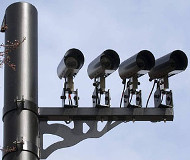Article from: www.thenewspaper.com/news/51/5101.asp
12/8/2016
Virginia Court Says License Plate Tracking Is Legal
Fairfax County, Virginia court rejects ACLU lawsuit designed to stop police tracking via license plate cameras.
 There are no limits on a private individual or government agency that seeks to track Virginia motorists by photographing their license plates and storing the information in a database. That was the ruling last month of a Fairfax County Circuit Court judge who rejected the contention that automated license plate readers (ALPR or ANPR in Europe) violate state data protection laws.
There are no limits on a private individual or government agency that seeks to track Virginia motorists by photographing their license plates and storing the information in a database. That was the ruling last month of a Fairfax County Circuit Court judge who rejected the contention that automated license plate readers (ALPR or ANPR in Europe) violate state data protection laws.
"There is one salient issue that this court must decide," Judge Robert J. Smith wrote in his November 18 ruling. "If a license plate reader is personal information, then the Fairfax County Police Department has violated the act."
Last year, the American Civil Liberties Union (ACLU) filed a lawsuit contending the county government's use of ALPR cameras to record the movements of all county residents for up to a year violated Virginia's Government Data Collection and Dissemination Practices Act. The activist group cited a 2013 state attorney general ruling (view ruling) that found the "passive" use of license plate cameras violated this statute.
Judge Smith disagreed with the applicability of the attorney general's ruling and found no case law anywhere at the state or federal level dealing with the question. So the judge reasoned that a license plate has no relation to the identity of an individual person.
"In the case of a social security number, the information leads leads directly to an individual," Judge Smith wrote. "A license plate number leads directly to a motor vehicle. By referring to other databases the license plate number can lead the researcher to the owner of the vehicle and nothing more. Even after determining the owner of a vehicle there is nothing more that can be determined. A license plate does not tell the researcher where the person is, what the person is doing, or anything else about the person."
The ACLU argued that tracking a license plate can reveal a great deal about an individual by showing which doctor he drives to, where he worships or what groups he belongs to. This was not persuasive to the court.
"It is unlikely that information that does not have a privacy interest could be classified as personal information," Judge Smith. "Notwithstanding the other arguments of counsel, once the issue of whether a license plate is personal information is decided in the negative, there is no material issue of fact and the analysis need go no further."
With that, the ACLU's suit was thrown out. A copy of the ruling is available in a 500k PDF file at the source link below.
Source: Neal v. Fairfax County Police (Fairfax County, Virginia Circuit Court, 11/18/2016)
Permanent Link for this item
Return to Front Page
 There are no limits on a private individual or government agency that seeks to track Virginia motorists by photographing their license plates and storing the information in a database. That was the ruling last month of a Fairfax County Circuit Court judge who rejected the contention that automated license plate readers (ALPR or ANPR in Europe) violate state data protection laws.
There are no limits on a private individual or government agency that seeks to track Virginia motorists by photographing their license plates and storing the information in a database. That was the ruling last month of a Fairfax County Circuit Court judge who rejected the contention that automated license plate readers (ALPR or ANPR in Europe) violate state data protection laws.